Related Research Articles
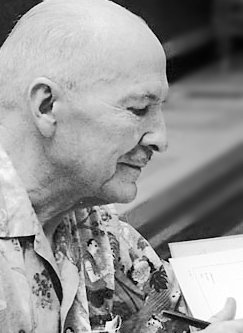
Robert Anson Heinlein was an American science fiction author, aeronautical engineer, and naval officer. Sometimes called the "dean of science fiction writers", he was among the first to emphasize scientific accuracy in his fiction, and was thus a pioneer of the subgenre of hard science fiction. His published works, both fiction and non-fiction, express admiration for competence and emphasize the value of critical thinking. His plots often posed provocative situations which challenged conventional social mores. His work continues to have an influence on the science-fiction genre, and on modern culture more generally.

Starship Troopers is a military science fiction novel by American writer Robert A. Heinlein. Written in a few weeks in reaction to the US suspending nuclear tests, the story was first published as a two-part serial in The Magazine of Fantasy & Science Fiction as Starship Soldier, and published as a book by G. P. Putnam's Sons on November 5, 1959.

Samuel Langhorne Clemens, known by the pen name Mark Twain, was an American writer, humorist, and essayist. He was praised as the "greatest humorist the United States has produced," with William Faulkner calling him "the father of American literature." Twain's novels include The Adventures of Tom Sawyer (1876) and its sequel, Adventures of Huckleberry Finn (1884), with the latter often called the "Great American Novel." He also wrote A Connecticut Yankee in King Arthur's Court (1889) and Pudd'nhead Wilson (1894) and cowrote The Gilded Age: A Tale of Today (1873) with Charles Dudley Warner. Ernest Hemingway claimed that "All modern American literature comes from one book by Mark Twain called Huckleberry Finn."
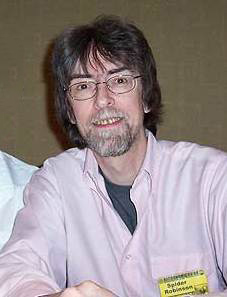
Spider Robinson is an American-born Canadian science fiction author. He has won a number of awards for his hard science fiction and humorous stories, including the Hugo Award 1977 and 1983, and another Hugo with his co-author and wife Jeanne Robinson in 1978.

The Lensman series is a series of science fiction novels by American author E. E. "Doc" Smith. It was a runner-up for the 1966 Hugo Award for Best All-Time Series, losing to the Foundation series by Isaac Asimov.

A crossover is the placement of two or more otherwise discrete fictional characters, settings, or universes into the context of a single story. They can arise from legal agreements between the relevant copyright holders, common corporate ownership or unofficial efforts by fans.
"The War Prayer", a short story or prose poem by Mark Twain, is a scathing indictment of war, and particularly of blind patriotic and religious fervor as motivations for war. The structure of the work is simple: an unnamed country goes to war, and patriotic citizens attend a church service for soldiers who have been called up. The people call upon God to grant them victory and protect their troops. Suddenly, an "aged stranger" appears and announces that he is God's messenger. He explains to them that he is there to speak aloud the second part of their prayer for victory, the part which they have implicitly wished for but have not spoken aloud themselves: the prayer for the suffering and destruction of their enemies. What follows is a grisly depiction of hardships inflicted on war-torn nations by their conquerors. The story ends with the man being condemned as a lunatic, "for there was no sense in what he said".

"The Celebrated Jumping Frog of Calaveras County" is an 1865 short story by Mark Twain. It was his first great success as a writer and brought him national attention. The story has also been published as "Jim Smiley and His Jumping Frog" and "The Notorious Jumping Frog of Calaveras County". In it, the narrator retells a story he heard from a bartender, Simon Wheeler, at the Angels Hotel in Angels Camp, California, about the gambler Jim Smiley. The narrator describes him: "If he even seen a straddle bug start to go anywheres, he would bet you how long it would take him to get to wherever he going to, and if you took him up, he would foller that straddle bug to Mexico but what he would find out where he was bound for and how long he was on the road."
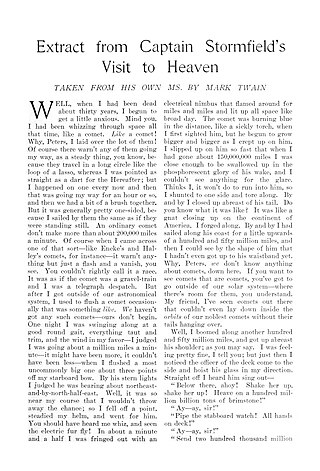
"Extract from Captain Stormfield's Visit to Heaven" is a short story written by American writer Mark Twain. It first appeared in print in Harper's Magazine in December 1907 and January 1908, and was published in book form with some revisions in 1909. This was the last story published by Twain during his life.

Charles Dudley Warner was an American essayist, novelist, and friend of Mark Twain, with whom he co-authored the novel The Gilded Age: A Tale of Today.

Sketches New and Old is a collection of short stories by Mark Twain. It was published in 1875. All the stories are fictional except for "The Case of George Fisher." It includes the short story "A Ghost Story", among others.
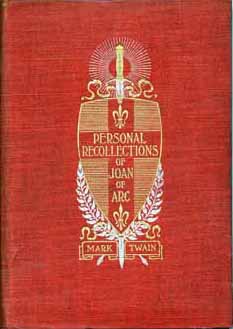
Personal Recollections of Joan of Arc, by the Sieur Louis de Conte is an 1896 novel by Mark Twain which recounts the life of Joan of Arc.
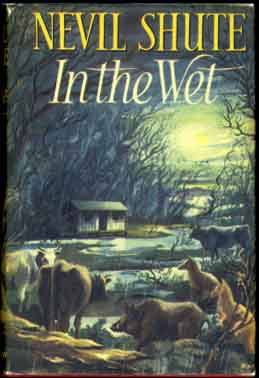
In the Wet is a novel by Nevil Shute that was first published in the United Kingdom in 1953. It contains many of the typical elements of a hearty and adventurous Shute yarn such as flying, the future, mystic states, and ordinary people doing extraordinary things.
The science fiction writer Robert A. Heinlein (1907–1988) was productive during a writing career that spanned the last 49 years of his life; the Robert A. Heinlein bibliography includes 32 novels, 59 short stories and 16 collections published during his life. Four films, two TV series, several episodes of a radio series, at least two songs and a board game derive more or less directly from his work. He wrote the screenplay for Destination Moon (1950). Heinlein also edited an anthology of other writers' science fiction short stories.

The Personal Memoirs of U. S. Grant are an autobiography, in two volumes, of Ulysses S. Grant, the 18th President of the United States. The work focuses on his military career during the Mexican–American War and the American Civil War. The volumes were written in the last year of Grant's life, amid increasing pain from terminal throat cancer and against the backdrop of his personal bankruptcy at the hands of an early Ponzi scheme. The set was published by Mark Twain shortly after Grant's death in July 1885.

Mark Twain's legacy includes awards, events, a variety of memorials and namesakes, and numerous works of art, entertainment, and media.
"Cannibalism in the Cars" is a short story written in 1868 by American writer Mark Twain. It tells the darkly humorous tale of apparent acts of cannibalism from the point of view of a congressman on a snowbound train. It indirectly satirizes the political system of the United States.
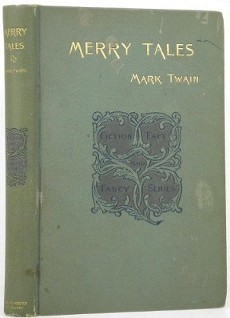
Merry Tales is a short volume with sketches by Mark Twain, published by Charles L. Webster and Company in March 1892.

Samuel Langhorne Clemens , well known by his pen name Mark Twain, was an American author and humorist. Twain is noted for his novels Adventures of Huckleberry Finn (1884), which has been called the "Great American Novel," and The Adventures of Tom Sawyer (1876). He also wrote poetry, short stories, essays, and non-fiction. His big break was "The Celebrated Jumping Frog of Calaveras County" (1867).

A Robert Heinlein Omnibus was a second collection of Robert A Heinlein's stories to use the term "omnibus" the first being The Robert Heinlein Omnibus (1958), published in 1966. Containing fifteen of Heinlein's short stories and novellas, this second "Omnibus" represents a short chronological period, 1940 to 1950, of Heinlein's writings.
References
- ↑ Robert A. Heinlein, Afterword to "Who are the Heirs of Patrick Henry?", 1980; in Expanded Universe , Baen Books, Riverdale, NY, 2003, pp. 326-327